Israeli Inventions Benefit the World
Jump to:
Summary – Agriculture – Water Generation – Bio-technology – Nano-technology – Vehicle Technology – Computing – Cyber Security – Military Innovations – Solar Innovations – Medical Science – Optics
See also Israeli Technology
Summary
Israel has been ranked first in the world for total expenditure on R&D (as a percentage of GDP), ranked first in the world in scientific publications, and has the highest density of start-up companies in the world. So it is not surprising that Israel has been ranked among the top ten most innovative countries in the world in two separate surveys [US News and World Report, January 2018].
Many in Israel have a vision – to make the world a better place. One way is to make medical advances like the ‘pillcam’, and technology to help paraplegics. Another way is to develop water saving technology as in ‘drip irrigation’ and so help feed the world. Yet another way is to help the environment, as in advances in electric cars and solar tower power plants.
Israeli inventions have resulted in Israel’s high economic ranking. The country has been described as an “economic miracle” since it has consistently had more companies listed on the electronic stock market (NASDAQ) than all of Europe combined. Also, Israel consistently scores as one of the top countries for patents per capita, see Venture Capital.
Is all this success a result of the amazing intelligence of the Israeli people? Maybe. But is it also because, in these closing days of the age, the God of Israel is blessing His people as they try to keep His commandments? For instance, Jerusalem is amazingly quiet on Saturday’s as Jews keep Shabbat.
Now it shall come to pass, if you diligently obey the voice of the Lord your God, to observe carefully all His commandments which I command you today, that the Lord your God will set you high above all nations of the earth. (Deut 28.1)
Agricultural Inventions
Since 2004 Israel’s R&D expenditure has accounted for typically 17% percent of the agricultural budget, link. Israel’s inventions in agriculture are now helping to feed the world:
Drip Irrigation: This system delivers the perfect amount of water and nutrients straight to the roots of each plant – not the soil, resulting in higher yields of healthier crops, link. These systems are self-cleaning and maintain uniform flow rate regardless of water quality and pressure.
Grain Cocoons: Grain harvests are often lost due to pests and mold. GrainPro Cocoons are a simple and cheap way for African and Asian farmers to keep their grain market-fresh. It’s huge bags keep water and air out.
Desert Fish: Israeli technology has developed aquaculture – fish farming in the desert! The system pumps low-quality brackish water from deep underground aquifers and fills land pools in the desert. The brackish, warm water is optimal for raising some type of marine fish and shrimp.
Biological Pest Control: uses beneficial insects and mites (minute orange spiders) for biological pest control. This predatory mite is a highly efficient enemy of the spider mite, a devastating agricultural pest, link.
World’s smallest cherry tomato: The “drop tomato” is about the size of a blueberry and the Kedma company in Israel’s southern Arava desert says it is possibly the smallest one ever cultivated in the world. “You don’t need to cut it: it just explodes in your mouth”.
Water Generation from the Air

Watergen, an Israel-based company uses humidity in the air to create clean and fresh drinking water. The heart of the Watergen product line is the revolutionary GENius™ heat-exchange technology. Air is drawn into the Atmospheric Water Generator (AWG), where it is thoroughly cleaned, removing any dust and dirt and leaving only pure air in the system. The clean air is then directed through the heat exchange and cooling process, bringing it to its dew-point – the temperature at which condensation occurs – to create water.
Watergen’s Large Scale unit is an industrial scale AWG, designed for towns, villages, factories, off-grid settlements and communities. It can generate up to 5,000 liters of clean water each day. The first AWG system was installed in New Delhi, India in 2017.
Bio-technology Inventions
Bio-technology is the exploitation (genetic manipulation) of biological processes for industrial purposes, and especially the production of antibiotics and hormones. Similarly, bio-engineering is the application of the principles of engineering and natural sciences to tissues, cells and molecules. Here’s several examples:
Organs on a Chip: Joint Israeli-German research may make animal experiments a thing of the past, They have developed a “liver-on-chip” device mimicking human physiology and so avoiding animal experiments. The research breakthrough came through the addition of nanotechnology-based sensors. They comment: “We realized that because we are building the organs ourselves, we are not limited to biology, and could introduce electronic and optical sensors to the tissue itself. Essentially we are building bionic organs on a chip. Because we placed sensors inside the tissue, we could detect small and fast changes in cellular respiration that nobody else could.” More generally, it is claimed that organs-on-a-chip contain a dynamic and interactive environment for living and breathing cells to survive outside the body and enables a more effective and safe R&D process for medicine testing, link, link.
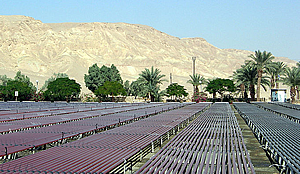
Algoculture in the Negev Desert. Image: Rémi Jouan via Wikimedia Commons, License Creative Commons
Bio-fuel – Energy from Algae: Algoculture is the mass culture of algae for industrial and commercial purposes. Researchers at Tel Aviv University have genetically altered single-celled algae, which naturally emit hydrogen throughout the day, allowing the organism to increase its efficiency to five times its natural ability. Hydrogen fuel cells are being introduced into vehicles, and this discovery could mean algae becomes a key player in the push for green energies, link. Put simply, humble pond slime can give a clean fuel for cars.
Israel’s biotech companies are developing new technologies, as in the industrial-scale manufacture of any cell type in the human body, a proprietary injectable drug to treat obesity, and a customized vaccine against a patient’s own cancer cells. More at Israel’s biotech research.
Nano Technology
Nanotechnology is the study and application of extremely small things (a sheet of newspaper is about 100,000 nanometers thick). The technology appears in many science fields, such as chemistry, biology, physics, materials science, and engineering. One amazing invention comes from the innovative company Nano Retina (offices in Herzliya, Israel). They have developed an ultra small artificial retina designed to restore sight. The miniature implant replaces the functionality of the damaged photoreceptor cells and creates the electrical stimulation required to activate the remaining healthy retinal cells.
Other nano inventions include: a biomaterial made of ultra-thin polymer fibers with properties that mimic those of human tissues and organs; a highly accurate and versatile inkjet deposition system for printing multi-layer circuit boards, and ultra-thin gold-silver nanowires formed on a substrate, which can be further coated with silver to obtain controllable conductivity, link. More at Israel’s nanotechnology companies.
Application to Cancer: Scientists at the Technion University in Haifa are working on a chemotherapy treatment that avoids the repercussions that cancer patients usually incur. It involves nano-sized “factories” that manufacture protein-based cancer drugs inside the body upon reaching the tumor site. At 150 nanometers or less—(1/1,000 the diameter of a human hair), these factories are injected into the patient and circulate in the blood until finding the tumor.
Car Technology
Highly Efficient Engine: Israeli start-up Aquarius Engines is working on an enhanced engine design which uses energy much more efficiently, and eliminates the valves and rods that cause energy loss (fewer parts). That means cars could travel more than 1,600 kilometres (990 miles) on a single tank of fuel, more than double current distances and strong competition for all-electric vehicles. The same technology can be used to make more efficient back-up generators. In another automotive development, Jerusalem-based Mobileye is helping to develop a fully autonomous, self-driving vehicle.
Fast Charging Car Battery: Israel’s Storedot company has developed a novel ultra-fast charging battery for electric cars. The battery ditches the traditional Lithium Ion makeup in favor of arranging layers of nano materials and proprietary organic compounds to support ultra-fast charges. The company claims its new FlashBattery technology allows you to charge an electric car in just five minutes!
Community-based Navigation – WAZE: WAZE is the world’s largest community-based traffic and navigation app for smartphones. By simply driving around with WAZE open on the phone, real-time information translates into traffic conditions and road structure for other users in the area. The Israeli company who developed the WAZE software (Waze Mobile) was acquired by Google in 2013.
This free GPS navigation app assumes an active data network connection is present on the mobile device. Without an internet connection, it can’t locate or navigate a route. The connection enriches WAZE with real-time traffic related information and ensures an up-to-date map. WAZE gets its location from Google Location Service in Android. It doesn’t get the location itself, it asks the phone. Android gets the location in several ways. Firstly it tries to use GPS, but if GPS is unavailable then the phone will try to estimate its location using cellular and WiFi networks.
Israeli Inventions in Computing
The Early Work: In the early days, Microsoft’s popular operating systems, NT and XP, were developed primarily in Israel. Also, mobile phone technology was developed in Israel, as in SMS (texting) and voice-mail, link. And when you use media such as Skype on the internet, you can thank Israeli companies for pioneering the Voice-over-Internet-Protocol (VoIP) underlying such cheap phone calls, link.
Flash Drives: M-Systems, an Israeli start-up company pioneered ‘DiskOnKey’ technology, known today as the ‘flash drive’ or ‘memory stick’. It enabled quick transfer of information from one computer to another, and today flash drives can hold significant information (1 TB). M-Systems and its USB technology was sold to SanDisk in 2006 for $1.55 billion.
DNA Computing: The breakthroughs in genetics developed to sequence the human genome have now made it relatively easy to precisely manufacture and manipulate DNA, which makes the molecule a leading candidate for use in molecular electronics. By itself, DNA does not act like a diode. However, when researchers inserted two small molecules of coralyne into certain points within DNA and applied 1.1 volts to the complex, electric current flowed through the DNA diode 15 times as strongly in one direction than the other. This is currently the world’s smallest diode!
Israeli inventions in Cyber Security
Cyber-security is big business in Israel, link. For instance, if you use Zone Alarm to protect your computer, you are using a product from Israel’s biggest cyber-tech firm, Checkpoint Software Technologies. Overall, about 200 Israeli companies now specialize in cyber-security, accounting for US$3 billion worth of anti-hacking exports in 2013. And 25% of the world’s venture capital-funded cyber-security startups are Israeli. So it is not surprising that international companies such as IBM, Cisco, Lockheed Martin and Deutsche Telekom are setting up cyber research centers in Israel to develop cyber-security and cyber-defense software, link. Today, Israeli security forces are developing methods of searching social media to obtain intelligence of prospective terror attacks.
WeCU Airport security: Israeli tech companies are working on an airport system that can detect emotional strain in a passenger – a specific kind of strain that is associated with people who intend to commit an act of terror, . WeCU Technologies uses psychology and physiology to detect problem passengers by causing them to have involuntary reactions which are instantly picked up and analyzed in real time.
Israeli Military Innovations
The Israel Defense Forces (IDF) are essentially defensive. Their goal is to defend the existence of the State of Israel, its independence and the security of the citizens and residents of the state, link. To this end Israel has developed very advanced defenses. Does this ‘benefit the world’? Yes – in the sense that an Israel that survives continues to be a witness to the existence of God. And an Israel that survives offers the only democracy in the Middle East, link, link. Here’s some of Israel’s defensive weapons:
Wall Radar: A handheld radar system for built-up area warfare operations. With a range of 20m it can determine, for example, how many people are present behind a wall, link.
Iron Beam: according to Rafael Advanced Defense Systems, Israel’s latest missile defense system uses a high-energy laser which can be mounted on ships or vehicles, link.
Iron Dome: the world’s only dual mission counter rocket, artillery and mortar and Very Short Range (70 km) Air Defense system, link.
David’s Sling: incorporates unique technologies that deal with maneuvering targets (fighter aircraft) and high-precision cruise missiles.
Arrow 3: this upper-most defense tier is a long-range missile defense system designed to intercept ballistic missiles outside the earth’s atmosphere, link
Unmanned Aerial Vehicles (UAVs or Drones): Israel’s Aerospace Industries, IAI, is a global leader in the design, development, and manufacture of remotely operated systems. It has over 40 years’ experience and 1,700,000 operational flight hours, performing intelligence gathering and targeting missions in support of key military operations around the world. The IAI Heron TP is the largest unmanned reconnaissance aircraft used by the Israeli Air Force. It is claimed Israel is the world’s largest exporter of military drones, link.
Besides military UAVs, Israel is also becoming a powerhouse in the development of commercial drones. For example, it is reported that the British Army deployed Rafael’s Drone Dome system to protect Gatwick airport in 2018.
At the end of the day, the IDF is helped by a divine hand; the God of Israel vows to defend Israel:
Whoever assembles against you shall fall … No weapon formed against you shall prosper … I will be a wall of fire all around her … he who touches you touches the apple (pupil) of His eye. (Isa 54.15,17; Zech 2.5,8)
Israeli inventions – Energy Innovations
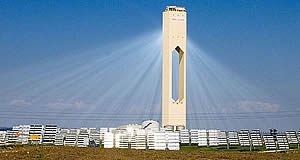
Commercial solar power plant based on a tower (Spain). Image: afloresm (SOLUCAR PS10 (2)), CreativeCommons-2.0, via Wikimedia Commons
As of 2017 there were 200 renewable energy companies in Israel, about 30% of which were start-ups.
Solar Power Plant: The Ashalim Concentrated Solar Thermal Power Station in the Negev desert has the world’s tallest solar power tower (250m), link, link. The station’s 50,000 computer-controlled heliostats (mirrors) track the sun and reflect its rays to a boiler on top of the tower. The boiler creates super-heated steam that drives a steam turbine, which generates electricity. The final complex will generate about 310 megawatts of power, enough to supply Israel with 16 percent of its energy needs.
Super-iron Battery: Researchers at Technion-Israel Institute of Technology in Haifa, Israel, are developing a new battery that looks set to replace conventional alkaline and NiCad batteries. Super-iron batteries have a 50 percent energy advantage compared to conventional alkaline batteries and are significantly (75 percent) rechargeable.
Storing Solar Energy: The Weizmann Institute is equipped with one of the most advanced solar research facilities in the world. One project collects sunlight in bright, arid regions and provides it as energy-rich gas or chemicals to energy-consuming regions. A complete plant with a processing capacity of 500 kilowatts has already been tested. Similar research is being done at Technion, Israel’s Institute of Technology. Using the power of the sun and ultra-thin films of iron oxide (rust), researchers have found a way to split water molecules into hydrogen and oxygen. This could lead to cheaper ways to store solar energy in the form of hydrogen-based fuels e.g. solar cells that can store solar energy for on-demand use, link.
Israeli inventions in Medical Science
About 1,000 Israeli companies are in healthcare or life-science products, including 700 in medical devices.
Israel’s medical inventions include a system to correct severe curvature of the spine (scoliosis), stem-cell therapy products to treat blood cancers and solid tumors, MRI-guided focused ultrasound to destroy tumors and uterine fibroid cysts without surgery, and nanotechnology “factories” that manufacture protein-based cancer drugs inside the body upon reaching the tumor site. More at Israel’s Medical Innovations”.
Generic Drugs: Teva was established in Jerusalem in 1901 and today Teva Pharmaceutical Industries Ltd. is Israel’s largest healthcare company. As the world’s leading provider of generic pharmaceuticals, Teva produces 120 billion tablets and capsules a year in 87 pharmaceutical and API (Active Pharmaceutical Ingredients) facilities around the world. It delivers solutions in key therapeutic areas, such as oncology (study and treatment of tumours), respiratory diseases (as in asthma and allergic rhinitis), and disorders of the central nervous system (CNS) – including sleep disorders and migraine.
Artificial Retina: Nano Retina’s Bio-Retina, is a tiny implantable device inserted into the retina in a 30-minute procedure. It turns into an artificial retina that melds to the neurons in the eye. Activated by special eyeglasses, the device transforms natural light into an electrical impulse that stimulates neurons to send images to the brain. The prototype is advancing quickly through clinical trials, link.
Apnea in Infants: Apnea is an unexplained episode of cessation of breathing for 20 seconds or longer, or a shorter respiratory pause. BabySense is a non-touch, no-radiation device designed to prevent crib death. Made by HiSense, the device monitors a baby’s breathing and movements through the mattress during sleep. An auditory and visual alarm is activated if breathing ceases for more than 20 seconds or if breath rate slows to less than 10 breaths per minute. HiSense is part of IATI – the Israeli umbrella organization of high-tech, life science and other advanced technology industries.
Optics and Sensors
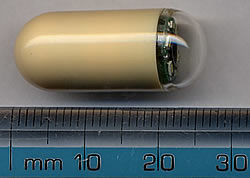
PillCam-Capsule Endoscope from Given Imaging
Given Imaging, an Israeli medical technology company, have developed a disposable pill-sized camera (the “Pillcam”) for wireless capsule endoscopy. Pillcam records images of the gastrointestinal tract, enabling physicians to visualize the small bowel, esophagus and colon without sedation or invasive endoscopic procedures.
Visual Aid: Israeli-based company OrCam have invented a camera device that attaches to eyeglasses and is wired to a portable computer in the wearer’s pocket. The device improves the lives of individuals who are blind, visually impaired, or have reading difficulties by speaking any text that the user points to, such as menus, street signs, grocery labels, newspapers and bus numbers.
USB-sized Spectrometer: Consumer Physics operating out of Tel Aviv, have invented the SCiO – a handheld infrared spectrometer the size of a normal USB stick. It works with a smartphone and determines the chemical composition of food, medicines, drinks, soil, plants, etc. The SCiO sensor emits near-infrared light that is reflected from the surface of the product. Catching the reflected light, the spectrometer analyzes and transmits data to the user’s smartphone.













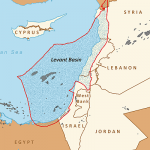



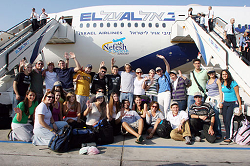









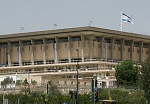



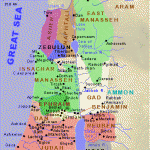
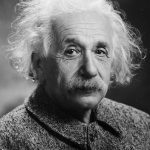

The top 5 and the best inventions of israel read it here https://facthubb.blogspot.com/2019/04/top-5-and-best-inventions-of-israel.html with full details.
Thank you for this link. Some of them are mentioned on our Israeli Inventions page.
I always thought……
Israel is the source of all civilisations….
and yet its true….
if its not, please may someone tell and fully explain to me….
am here to know.
thank you….